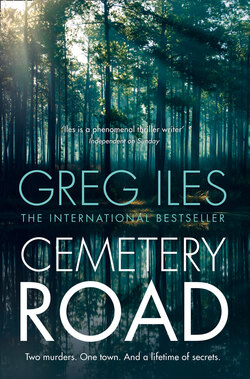Читать книгу Cemetery Road - Greg Iles - Страница 8
CHAPTER 2
ОглавлениеHUNCHED ON HIS knees, Buck Ferris pulled a ball of fired clay from the sandy soil beside the Mississippi River, then got to his feet with a groan and climbed out of the hole beside the foundation pier. It was difficult to be certain about the era by moonlight, and he couldn’t risk a light—not here. And yet … he was certain. The sphere sitting in his palm had been fired a few centuries before Moses started wandering through the desert with the children of Israel. Ferris had been an archaeologist for forty-six years, but he’d never discovered anything like this. He felt as though the little ball were vibrating in his hand. The last human to touch this clay had lived nearly four thousand years ago—two millennia before Jesus of Nazareth walked the sands of Palestine. Buck had waited all his life to find this artifact; it dwarfed everything he’d ever done. If he was right, then the ground upon which he stood was the most important undiscovered archaeological site in North America.
“What you got there, Buck?” asked a male voice.
Blue-white light stabbed Ferris’s eyes. He nearly pissed himself, he was so stunned. He’d thought he was alone on the vast, low-lying ground of the industrial park. A quarter mile to the west, the eternal river flowed past, oblivious.
“Who are you?” Ferris asked, throwing up his left hand to shield his eyes. “Who is that?”
“You were warned not to disturb this ground,” said the man behind the light. “It’s private property.”
The speaker had a refined Southern accent that tickled Buck’s memory. He couldn’t quite place it, though. Nor could Buck say much in his own defense. He’d applied for permission to dig in this earth seven times over the past forty years, and he’d been turned down every time. But five days ago, the county had cleared the debris of the electroplating factory that had stood here since World War II. And two days from now, a Chinese company would begin building a new paper mill in its place. If anyone was going to find out what lay beneath this ground, it was now—the consequences be damned.
“Where did you come from?” Buck asked. “I didn’t see anybody when I came down here.”
“Oh, Buck … You always were a good ol’ boy. Why couldn’t you have left well enough alone?”
“Do I know you?” Ferris asked, certain that he’d heard that voice before.
“You don’t seem to.”
“I don’t think you understand the value of what I have here,” Ferris said, his voice edged with excitement.
“You don’t have anything there,” said the voice. “You’re not here.”
Buck got the gist of it then, and something started thrumming in his belly, like stretched-taut wire plucked hard. “Wait, listen,” he tried, “this ground you’re standing on … it’s an Indian settlement that’s four thousand years old. Maybe five or six thousand, depending on what I find if we dig deeper.”
“You hoping for a PBS series?”
“God, no. Don’t you understand what I’m telling you?”
“Sure. You found some Injun bones. Thing is, that’s bad news for everybody.”
“No, listen. There’s a site just like this only fifty miles from here, in Louisiana. It’s called Poverty Point. It’s a UNESCO World Heritage site. Thousands of tourists visit it every year.”
“I’ve been there. A couple of mounds of dirt, and the grass needs cutting.”
Buck realized then that this was like trying to tell a hillbilly about Bach. “That’s ridiculous. You—”
“A billion dollars,” the man cut in.
“Beg your pardon?”
“A billion dollars. That’s what you could cost this town.”
Buck tried to focus on the conversation, but the ball in his hand still felt like it was vibrating. Known as a “Poverty Point object,” it had been used by Indians to cook meat under dirt. God only knew what else lay in the loess soil beneath their feet. Pottery, spear points, jewelry, religious artifacts, bones. How could someone not understand what it meant to stand on this ground and know what he knew? How could someone not care?
“This doesn’t have to ruin your deal,” he said. “Situations like this get handled all the time, to the satisfaction of all parties. The Department of Archives and History comes in, assesses the site, and then they move things, if that’s even necessary. To protect them. That’s all.”
“Would they have moved all of Poverty Point to build a paper mill, Buck?”
No, he thought. They wouldn’t.
“A billion dollars,” the man said again. “In Mississippi. That’s like ten billion in the real world. And that doesn’t begin to address what it could cost me personally to lose the mill.”
“Could you take that light out of my eyes?” Buck asked. “Can’t we talk like civilized men?”
“Do it,” said the voice.
“What?” Buck said. “Do what?”
“I always liked your guitar pickin’,” said the man. “You should’ve stuck to that.”
Buck heard something shift on the ground behind him, but he couldn’t turn fast enough to see who was there, or to protect himself. A white afterimage on his retinas filled his eyes, and out of that whiteness came a dense black rectangle.
Brick.
He threw up his hands, but too late. The brick crashed into his skull, scrambling his perception. He felt only pain and the lurching nausea of falling into darkness. His wife’s face flickered in his mind, pale with worry when he’d left her earlier tonight. As he collided with the earth, he thought of Hernando de Soto, who died near the Mississippi in 1542, not far from here. He wondered if these men would bury him beside the river he’d loved so long.
“Hit him again,” said the voice. “Beat his brains out.”
Buck tried to cover his head, but his arms wouldn’t move.
